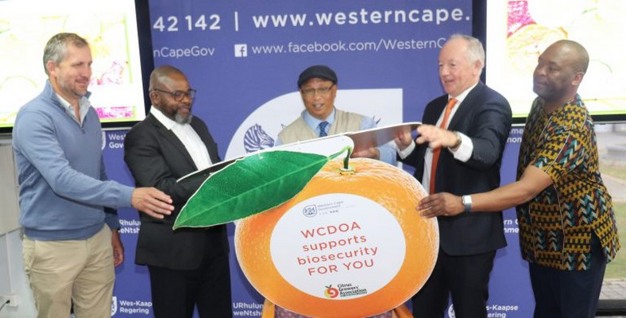The Western Cape Department of Agriculture has presented a R2 million cheque to the Citrus Growers Association (CGA) to support the Sterile Insect Technique (SIT) programme aimed at suppressing False Codling Moth (FCM). FCM is a phytosanitary pest affecting export crops such as citrus, table grapes, and stone fruit.
The support received from the provincial government is a significant step in expanding the use of a truly groundbreaking method. SIT offers immense potential in reducing pest pressure and ensuring that South African agricultural products meet the strict standards required by international markets. Addressing FCM in the Western Cape will contribute to increased export earnings for especially the citrus industry, creating jobs and uplifting rural communities. SIT also reduces the reliance on environmentally harmful pesticides and leads to improved fruit quality.
 Left to right: Gerrit van der Merwe: Chairperson of the Citrus Growers Board; Dr Mogale Sebopetsa: Head of Department: Western Cape Department of Agriculture; Dr Ivan Meyer – Western Cape Provincial Minister of Agriculture; Justin Chadwick: CEO, Citrus Growers Association; Lukhanyo Nkombisa: General Manager, CGA Grower Development Company.
Left to right: Gerrit van der Merwe: Chairperson of the Citrus Growers Board; Dr Mogale Sebopetsa: Head of Department: Western Cape Department of Agriculture; Dr Ivan Meyer – Western Cape Provincial Minister of Agriculture; Justin Chadwick: CEO, Citrus Growers Association; Lukhanyo Nkombisa: General Manager, CGA Grower Development Company.
SIT utilises cutting-edge science. Colonies of FCM are raised in special facilities. The male and female insects are sterilized using radiation from the isotope Cobalt-60 and are safely released in large numbers. Females mated with sterile males then lay eggs that do not hatch. A large decline in the pest population follows.
Trials for the SIT programme in Citrusdal began in 2005 through a collaboration with the United States Department of Agriculture and the International Atomic Energy Agency. The successes that followed lead to the founding of X Sterile Insect Technique (X-SIT). X-SIT now administers the SIT programme lending the programme their expertise.
Despite its immense potential, the SIT programme faces challenges in that it is expensive. The high cost of SIT compared to cheaper but much less sustainable alternatives threatens its long-term viability.
The programme currently covers 20,400 hectares but has the potential to expand to over 40,000 hectares with adequate funding. This expansion could facilitate the creation of an estimated 50 job opportunities. The CGA has emphasized the critical need for financial support to sustain and grow the SIT program, ensuring the continued production of export-quality residue-free fruit.
Currently, the entire programme is funded by citrus and table grape growers who use the service themselves. However, the R2 million funding received aims to alleviate some of the financial burdens of the Western Cape growers and help ensure the continuation and expansion of this vital pest management strategy.
For more information:
Daniel Johnson
Spokesperson for Minister Ivan Meyer
Tel.: 0799904231
Email: [email protected]
